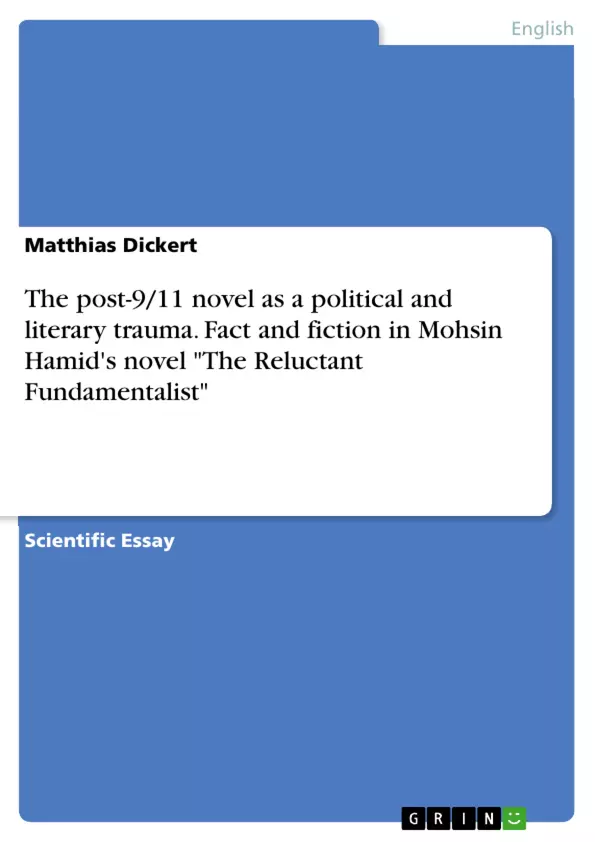It has now been fifteen years since America and the world were hit by a terror attack of a new and unknown quality. The Muslim terrorists belonging to Bin Laden's terror network Al- Qaida who hijacked several planes to use them as lethal weapons against America and her symbolic role as the country of freedom and democracy started a new era of political, social and religious uproar and chaos inexperienced so far.
This chaos expressed itself not only in the Gulf Wars that were to follow or the ongoing wars in Lybia, Syria, Iraq or Afghanistan and the migration waves to Europe as a result from all this it also paved the way for a literary embodiment of 9/11 as a literary element which has found a fixed place within migrant writing in the widest sense and Muslim writing in particular.
The fact that writers from East (and West) incorporated this key date into their novels threw light on the fact that 9/11 did not only function as a global, national, collective, religious or individual trauma it also showed its widespread application for plot, character, constellations, speech and reception of many authors. The introduction and employment of 9/11 into contemporary literature slowly but steadily showed its ongoing importance for contemporary writing.
In 2007 the newspaper USA Today declared on a headline that 'Novels about 9/11 can't stack up to non -fiction' thus throwing light at the multiple use of it as a narrative element. In 2015 an editor for The New York Times Book Review suited that the necessity for a 9/11 novel goes on because it reflects 'a new age of terror'.
The fact that 9/11 is a widely used element of Muslim writing shows that it is this group of contemporary novelists who are aware of its manifold use for literature.
Literature is, however, always a reflection of social, political and religious conditions and it is exactly this link which is of special interest here.
The author of this text therefore first of all gives a general introduction into 9/11 before he tries to reflect in with Muslim writing and the post-9/11 novel thus throwing light on the close link between both sides and the literary conequences resulting from this. This will be done with the help of Mohsin Hamid's novel The Reluctant Fundamentalist (2007) which has by now been accepted as a masterpiece of this new genre.
Inhaltsverzeichnis (Table of Contents)
- I. 9/11 - a historical and political survey
- II. The influence of 9/11 on Muslim Writing.
- III. The Reluctant Fundamentalist - the prototype of a 9/11 novel..
- IV. Conclusion....
- V. Bibliography..
Zielsetzung und Themenschwerpunkte (Objectives and Key Themes)
This article aims to explore the impact of the 9/11 terrorist attacks on contemporary Muslim writing, specifically focusing on the rise of the "post-9/11 novel." It examines how the event has been incorporated into literary narratives, particularly through the lens of Mohsin Hamid's The Reluctant Fundamentalist (2007).
- The historical and political context of 9/11 and its global consequences.
- The influence of 9/11 on Muslim writers and the development of a distinct "post-9/11" literary genre.
- The portrayal of the "War on Terror" and its impact on societal perceptions of Islam and Muslims.
- The exploration of themes of identity, belonging, and cultural conflict in the context of post-9/11 society.
- The analysis of The Reluctant Fundamentalist as a representative example of the "post-9/11 novel."
Zusammenfassung der Kapitel (Chapter Summaries)
Chapter I provides a historical and political overview of the 9/11 terrorist attacks, examining their global impact and the subsequent "War on Terror." It explores the political rhetoric surrounding the event, including the use of terms like "axis of evil" and the historical parallels drawn to the Second World War. The chapter also discusses the slow literary incorporation of 9/11 and its significance for contemporary writing.
Chapter II focuses on the influence of 9/11 on Muslim writing, highlighting the rise of a distinct literary genre centered on the event. It examines the use of 9/11 as a narrative element and its impact on themes of identity, belonging, and cultural conflict. The chapter also discusses the unique challenges faced by Muslim writers in the post-9/11 world.
Chapter III analyzes Mohsin Hamid's The Reluctant Fundamentalist as a prototype of the "post-9/11 novel." It examines the novel's narrative structure, character development, and thematic concerns, exploring how it reflects the anxieties and complexities of the post-9/11 world. The chapter also discusses the novel's reception and its critical acclaim as a significant contribution to the genre.
Schlüsselwörter (Keywords)
The key themes and topics explored in this text include: 9/11, post-9/11 literature, Muslim writing, the "War on Terror," identity, belonging, cultural conflict, The Reluctant Fundamentalist, Mohsin Hamid, and the "post-9/11 novel."
Frequently Asked Questions
What is a "post-9/11 novel"?
It is a literary genre that emerged after the 2001 terror attacks, focusing on themes of trauma, the "War on Terror," and the social changes affecting the global community.
How did 9/11 influence contemporary Muslim writing?
The event became a central narrative element for many Muslim authors, allowing them to explore issues of identity, belonging, and the perception of Islam in the West.
Why is "The Reluctant Fundamentalist" considered a prototype of this genre?
Mohsin Hamid's novel effectively captures the shift in cultural identity and the political tensions between the East and West following the 9/11 attacks.
Is literature a reflection of political conditions?
Yes, the text argues that post-9/11 literature serves as a mirror to the historical, religious, and social uproar experienced globally after the attacks.
What are the common themes in post-9/11 literary trauma?
Key themes include collective and individual trauma, the search for identity in a suspicious society, and the conflict between personal values and global politics.
- Quote paper
- Dr. Matthias Dickert (Author), 2016, The post-9/11 novel as a political and literary trauma. Fact and fiction in Mohsin Hamid's novel "The Reluctant Fundamentalist", Munich, GRIN Verlag, https://www.grin.com/document/341804



